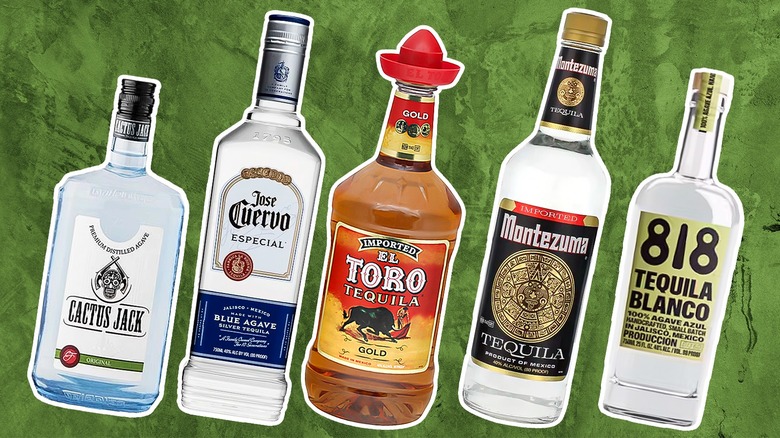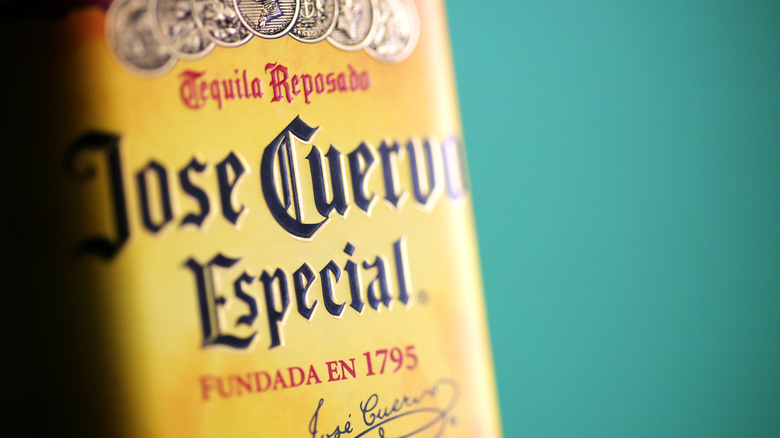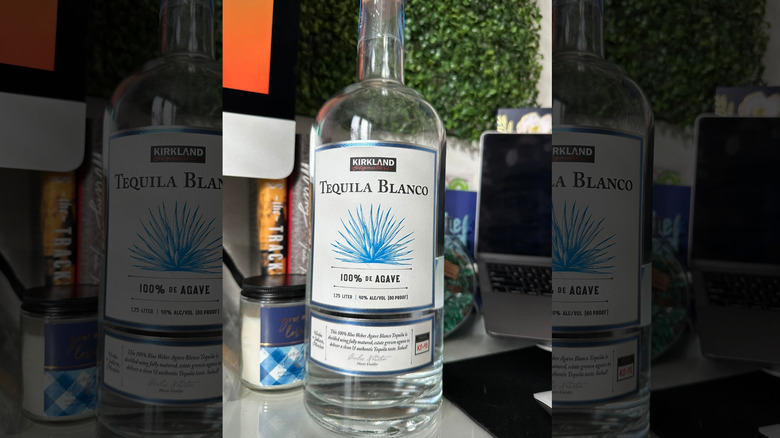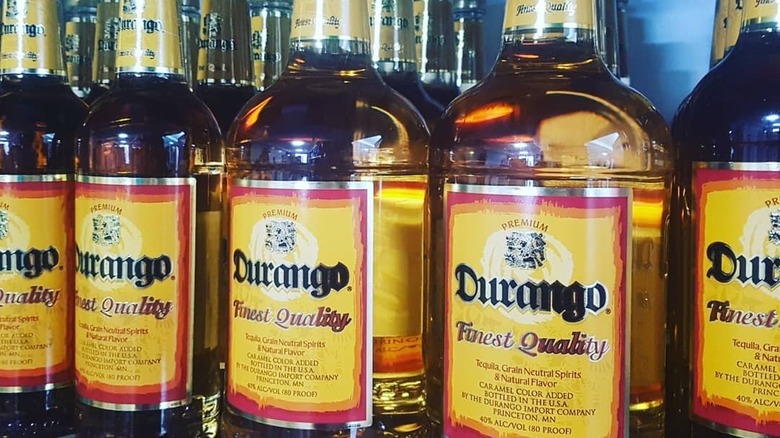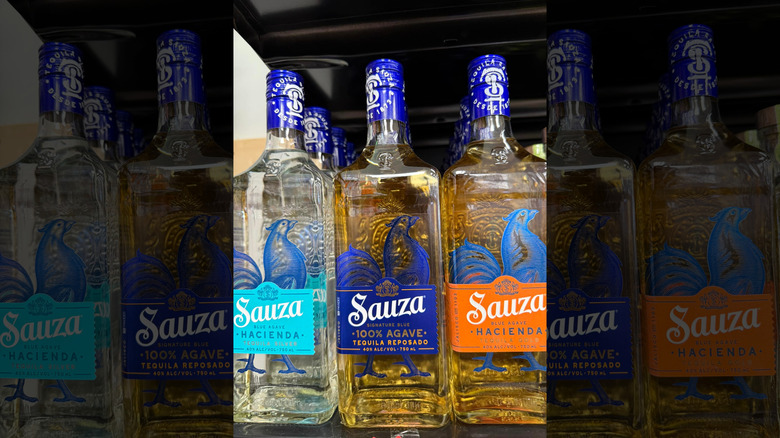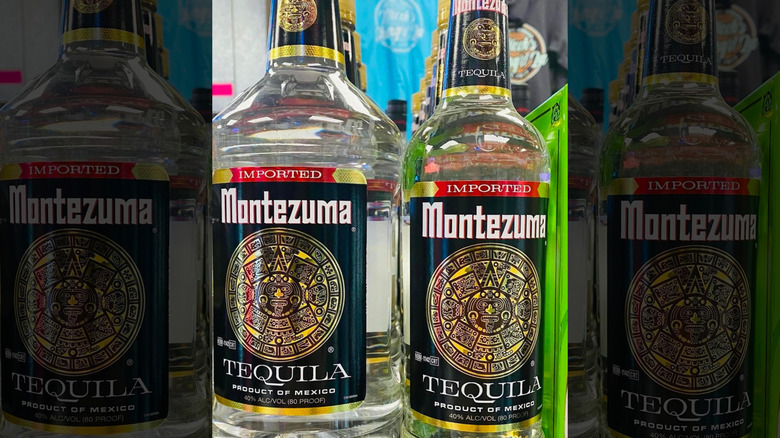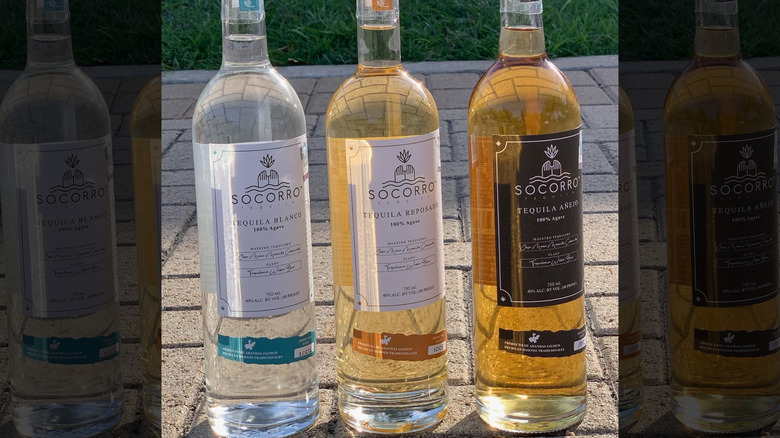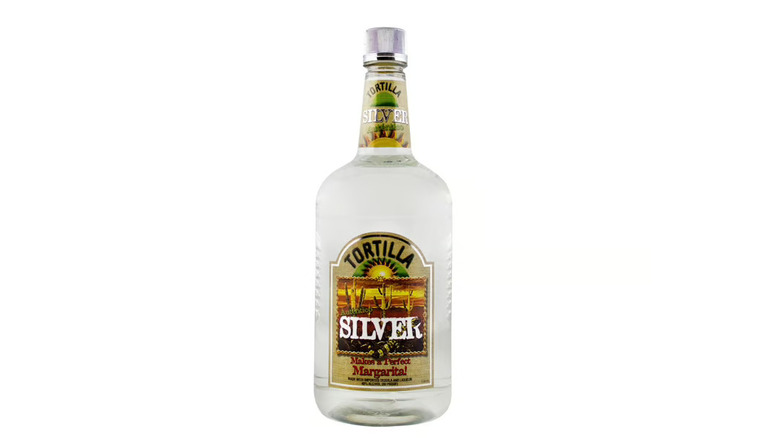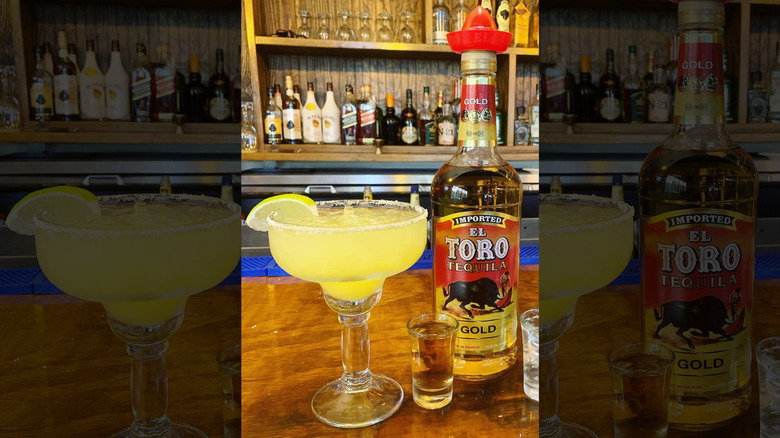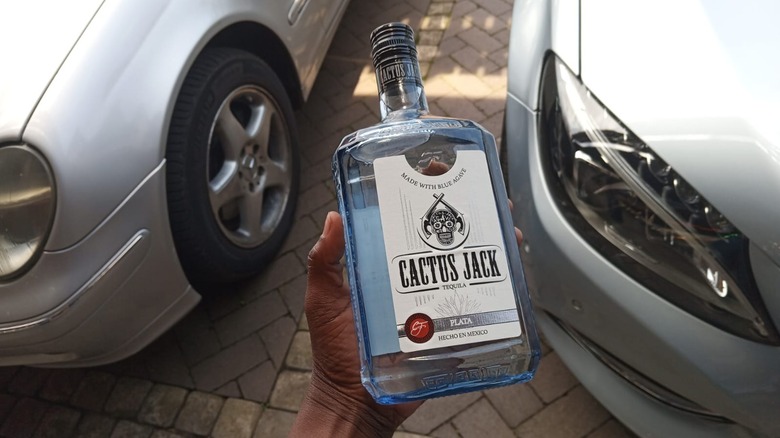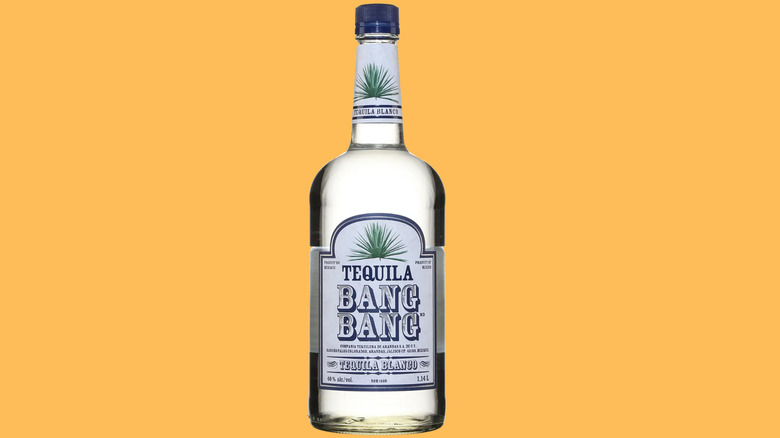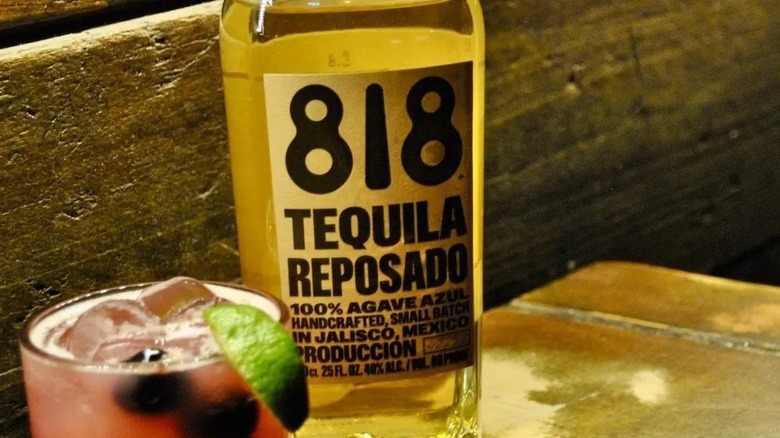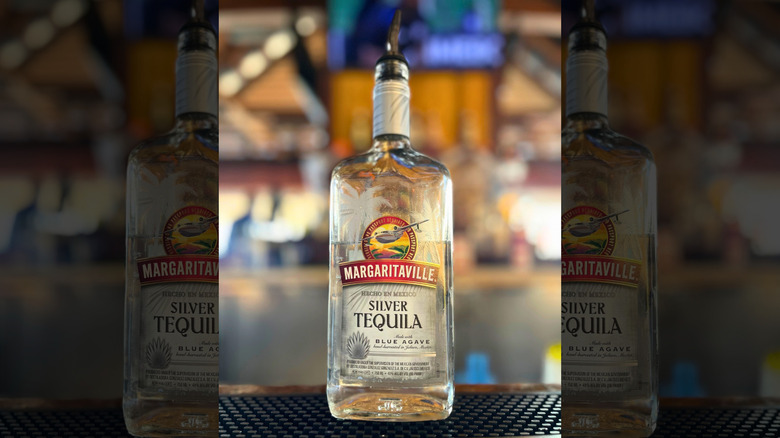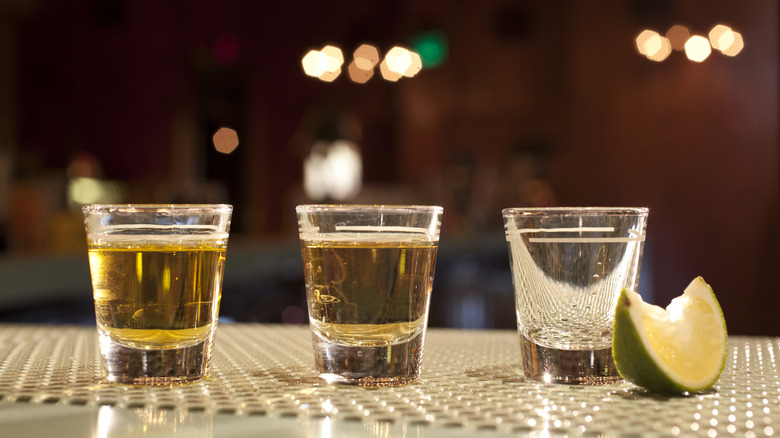12 Tequila Brands You Should Skip Buying
There's never exactly been a shortage of tequila brands to choose from, but in recent years, the agave-based spirit has become more popular than ever. As the fastest-growing spirit category in the United States, there's been an influx of new tequila brands introduced to the market. Existing producers have also repositioned, rebranded, and revitalized their brand marketing as they aim to capitalize on these consumer trends. The upside of the Mexican spirit's increased popularity is that it's easier than ever to get your hands on world-class tequila. The drawback, however, is that there are plenty of brands — both new and established — that seem solely focused on mass production and marketing over quality.
Unlike some other spirits, the regulations around tequila production are relatively relaxed these days. It only needs to be made with 51% agave sugars to be considered tequila — anything less is considered a mixto. Producers can also use additives and colorings to tweak the spirit to their liking. Plus, there are modern production methods that improve efficiency and yields at the expense of quality.
My career in the bar industry has given me the chance to try different styles of tequilas from countless brands. While I can recognize a quality, premium tequila, I'm no snob. A tequila doesn't have to be top shelf to be a suitable well liquor or be useful for making cocktails. The tequila brands below are ones I've tried personally and either have no redeeming features or have better alternatives available at a similar or lower price.
Jose Cuervo
Jose Cuervo is the world's largest tequila brand by an extremely significant margin. You can find it in every corner of the planet, and it's still growing year-on-year. For many people, it's the first tequila they ever try. It's also one of the main reasons people think they don't like tequila.
Jose Cuervo's Especial line consists of mixto tequilas cooked using the diffusion method, and the result is a cheap, unpalatable spirit with a harsh medicinal taste. There's very little agave present, and the flavors that do appear taste entirely synthetic. The quality improves ever so slightly with Tradicional range, made with 100% blue agave cooked in traditional stone ovens, but it still tastes like a heavily adulterated spirit. A few years ago, you could maybe overlook the poor quality because of the extremely low price. Nowadays, however, there are equally cheap brands that are producing tequilas of far higher quality. Things don't really improve until you get to Jose Cuervo's Reserva expression, but with an asking price just shy of $200, you'll find much better — and cheaper — elsewhere.
Kirkland Signature
As you may know, Kirkland Signature is the sole store brand of Costco, one of the largest wholesale retailers in the world. Normally, I'd steer well clear of store-brand spirits, but it has to be said, many of the Kirkland offerings aren't half bad. Unfortunately, that doesn't apply to its tequila.
The biggest problem with the Kirkland spirit range is the lack of transparency surrounding who actually makes the stuff. Costco doesn't distill anything itself, so it has to rely on established producers. The names of these producers aren't typically made public, which leaves customers in the dark as to how the spirits are made and what ingredients or additives are used. Interestingly, we actually do know who currently makes Kirkland tequila because the bottles have a traceable number — called a Norma Oficial Mexicana (NOM) — that's required by the Mexican government. We also know that Kirkland tequila has had at least two other producers in recent years.
The result is a brand that's extremely inconsistent, particularly when you consider the impact that geography has on the flavor of tequila. Ultimately, Kirkland tequila is often considered mediocre at best, and the aged expressions lack depth, complexity, and flavor.
Durango
I know I said that I'm not a snob, but if a spirit comes in a 1.75-liter plastic bottle, it's a sign to walk away. Durango is an extremely low-end spirit that barely deserves to be called a tequila. I will give the brand credit for at least being somewhat transparent with the labeling, which describes Durango as "tequila, grain neutral spirits, and natural flavor."
I've seen product descriptions of Durango that claim adding grain spirits creates a cleaner tequila taste, but nothing could be further from the truth. Rather, it creates a thin spirit with a chemical palate and metallic aftertaste — a rough liquor that no amount of "natural" flavorings can save. I'd like to say that you could possibly use Durango to knock up large batches of cheap frozen margaritas, but there are still better options that might cost a little more but won't leave you with a killer headache and mouthful of regret.
Sauza
When a brand is considered to be foundational to the history of a particular spirit, we usually expect great things. Although Sauza's ties to tequila-making don't go back quite as far as Jose Cuervo's, it can still claim 150 years' worth of experience. The founder, Don Cenobio Sauza, built the distillery that's still used today. The company also claims Don Cenobio, who is often considered a father of tequila, coined the term "tequila," and that Sauza was the first tequila exported to the United States.
Unfortunately, that heritage doesn't seem to have translated into a quality modern product. Sauza hasn't really been considered a premium tequila brand for a long time now. It wasn't a terrible choice for a lower-end well spirit that could be mixed or choked down in a shot with salt and a lime wedge. However, at some point, Sauza started using diffusers to extract its agave sugars, and the quality has dropped even further.
The distiller acknowledges the diffusion method is more efficient but also claims it results in a better tequila, something that few people would agree with. Sauza's mixto and 100% agave expressions are all tainted with an artificial sweetness and a harsh alcohol profile that make them poor options for anyone who likes authentic, tasty tequila.
Montezuma
One of the most obvious giveaways that Montezuma is a tequila to avoid — besides the plastic bottle — is the fact that even the company that makes the stuff seems to be embarrassed by it. Montezuma was originally owned by Barton Brands, the drinks company that ran the Barton 1792 Distillery in the home of bourbon: Bardstown, Kentucky. Barton Brands and its distillery changed hands a few times over the years before ending up under the umbrella of the beverage powerhouse, Sazerac. It seems telling that of all the brands Sazerac lists on its website, Montezuma is nowhere to be seen.
You can't blame Sazerac for appearing to avoid association with Montezuma tequila, as the spirit is irredeemably bad. It pretty much sells itself because it's so cheap, and it's usually only found at frat parties and dingy dive bars. It's extremely harsh and tastes more than a little like nail polish. Hats off if you can detect any agave flavor in there, because I sure couldn't. It's a shame to think of all the people who are now missing out on the wonderful world of tequila because their first experience was with Montezuma.
Socorro
A relatively new tequila company from Texas, Socorro ticks all the right boxes in terms of branding, but the product itself is severely lacking. Its sleek website is packed with marketing buzzwords and inspirational quotes to the point that it almost reads like satire. I'll give Socorro credit for its charitable initiative — donating a case of water to underprivileged Mexican communities for every case of tequila sold — but we're here to talk about the stuff in the bottle.
Despite using 100% blue agave and employing traditional cooking and sugar extraction methods, Socorro doesn't taste like true tequila. Along with its tequila blanco, the company makes a reposado and an añejo expression, but all three have hugely pronounced vanilla and caramel notes that taste like they came from additives rather than a barrel — though the company claims its products are additive-free. While the tequila is palatable, it's hard to pick out any genuine agave character, and the synthetic flavors mean it doesn't play well in tequila-based cocktails. Socorro is a much better introduction to tequila than Jose Cuervo or Montezuma, but it's not a good representation of what the spirit should be.
Tortilla
Tortilla is another brand that is supposedly owned by Sazerac, although it's hard to find any evidence of the company itself bragging about the stuff. The fact that a 1.75-liter plastic bottle of Tortilla tequila will only set you back around $15 should be enough of a warning sign that you're not going to find a quality spirit inside.
The Tortilla bottle also provides a telling clue that it's a spirit to skip. Although it's commonly listed as a tequila, the label refers to Tortilla as being "made with imported tequila and liqueur" and claims it "makes a perfect margarita." The wording deftly avoids actually referring to the liquor as tequila. Considering that real tequila must be made in Mexico regardless of quality, it's unclear whether Tortilla even meets the criteria to be called tequila. Even if that wasn't the case, the spirit itself is simply awful. There's a pronounced acetone taste, and the whole experience is rough from nose to finish. I can't think of a single occasion where Tortilla is worth buying unless the hardware store is out of paint thinner.
El Toro
The first giveaway that El Toro is a brand to skip is the plastic red sombrero affixed atop the bottle cap — a sign that the brand may rely on novelty rather than quality to shift its product. El Toro isn't the only brand to utilize this gimmick, but I'm yet to try a tequila with a sombrero that passes muster. It's also another Sazerac mass-market brand that fails to make an appearance on the drinks conglomerate's website.
You'll often see El Toro listed as being made with 100% agave, but this appears to be a misunderstanding by the suppliers. The real answer can typically be found on the label of a tequila bottle. Tequilas made with 100% agave never fail to highlight that fact. In the case of El Toro, there's no such claim anywhere on the bottle, meaning it's likely a mixto. This is backed up by the poor taste and extremely low price of around $10-12 a bottle. It has the harsh alcohol profile of a low-quality tequila along with a strong chemical flavor and little sign of any agave.
Fortunately, El Toro isn't particularly common in the United States. You're more likely to see it overseas in countries where imported spirits are more expensive to buy.
Cactus Jack
Produced by a South African drinks company, Alternative Beverage Corp, Cactus Jack is a pretty strange product. The website alone is a bizarre affair, with the product descriptions reading like an AI chatbot was tasked with creating its own spin on a Captain Morgan-esque brand character. Cactus Jack Original isn't even tequila — it's a 12% ABV sours-style liqueur made with "premium distilled agave." While it's not the worst thing I've ever drunk, it tastes nothing like actual tequila and has no real use outside of making rounds of cheap shots.
Cactus Jack does have an actual tequila line featuring plata, gold, and reposado expressions, but these are also lackluster. The spirit is distilled in Mexico by Casa Don Roberto, and while the producer has some palatable but unnoteworthy 100% agave tequilas under its own branding, the Cactus Jack stuff is pretty undrinkable. However, Cactus Jack's worst crime by far is the creation of its flavored, agave-based, faux-tequila sours. The honey variant is sickly sweet and seems like the sort of thing underage teenagers would sneak out and drink at the local skatepark. The less said about the bubblegum variant, the better.
Tequila Bang Bang
The best way I can describe Tequila Bang Bang is that it's essentially Canada's equivalent to Montezuma — a dirt-cheap spirit aimed at Canadian college students. Bang Bang is distilled in Mexico by Compañia Tequilera de Arandas; however, it doesn't appear on the distillery's list of brands.
There's really not much transparency around Bang Bang's production besides the listing of the distiller. There's no claim of 100% agave, so it's almost certainly a mixto. The giveaways are the extremely harsh, unbalanced flavor and total lack of agave notes. I wouldn't even attempt to try shooting Bang Bang — trust me on that one — and I can't see the point in ruining a cocktail or mixed drink with the stuff. Fortunately, it's unlikely you'll see this stuff outside of Canada, but there's no harm in knowing to avoid Bang Bang if you ever come across it.
818
It was only a matter of time before we landed on a celebrity tequila brand given how popular the venture has become among Hollywood's stars. Tequila isn't the only type of spirit to get this treatment, but it's arguably the most common, especially since George Clooney sold his Casamigos brand to Diageo for an eye-watering billion bucks.
It's worth pointing out that some of these celebrity liquors and spirits are actually pretty good. However, while some celebs have managed to create a quality product before they've slapped their famous face on it, others seem to believe their marketing presence alone might be enough. Kendall Jenner's 818 tequila falls firmly into the latter category. The 100% agave tequilas in Jenner's range aren't completely undrinkable, but they're so sweet they taste more like vanilla-flavored dessert liqueurs than actual tequila. So, while not unbearably harsh, they have practically no use in cocktails either.
While the same could be said for some other celebs, Jenner has also come under fire for alleged cultural appropriation of the Mexican spirit. You've also got the fact you're paying a premium for the Jenner name, particularly if you decide to purchase the Reserve edition, which can cost upwards of $200.
Margaritaville
The fact that Margaritaville is still a relatively popular tequila brand is likely due to Sazerac's strong marketing of the stuff. It can't be because of the taste. Interestingly, this time, you'll actually find Margaritaville listed on Sazerac's company website. I will point out that I didn't realize just how many of these budget tequilas were owned by Sazerac until I took a deeper dive into their backgrounds. I'm a huge fan of many of the company's brands, but it is interesting to see which ones are seemingly kept at arm's length.
Moving on to the tequila itself, Margaritaville tastes exactly how you'd expect a spirit named after a Jimmy Buffett song to taste. It has a generally synthetic flavor that's similar to most other low-quality tequilas. It's still rough around the edges, but some of that harshness is lessened by its abundantly sugary profile. You might think to yourself, "Well, of course you're not supposed to sip it neat, it's made for margaritas," but there are far better tequilas for making margs. I'd only use Margaritaville for the classic cocktail if I wanted a boozy citrus drink and didn't actually like the taste of tequila.
Methodology
The majority of the tequila brands in this article are ones that I've encountered over an extensive career in the hospitality industry as both a cocktail bartender and bar manager. Those I didn't encounter through work, I tried on my own time as someone who has a deep passion for spirits and cocktails.
As I mentioned at the top of this piece, I don't believe a spirit has to be world-class to have value. There are plenty of budget spirits that are great for mixing and are worthwhile additions to a bar, but the brands above are those that fail to meet those criteria. Despite these being my personal opinions, if you look up reviews online for these brands, you'll find most of my thoughts are shared by other tequila drinkers and industry professionals. There are perhaps one or two entries that have their fans, but for me, they taste inauthentic or are overpriced for what they are.
